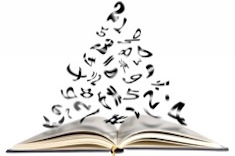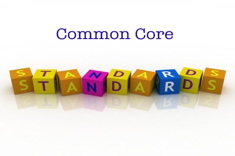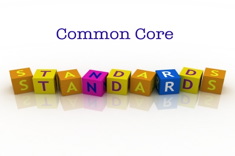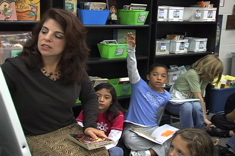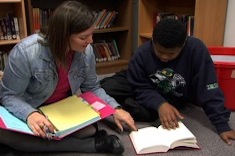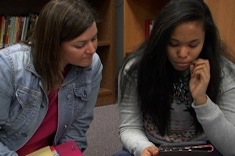If we’re not talking to kids about what they’re reading, then it doesn’t matter what kind of book they choose. It’s the thinking and talking that help students unravel a text’s complexity.
Patrick Allen
Sydney, a seventh grader, and I were in a local bookstore looking for some new reading material. Unless she finds just the right book, she doesn’t want to read. Unfortunately she also believes there are very few ‘just-right books’ that satisfy her reading interests. In elementary school she struggled, but she’s turned it around and was recently told she’s reading on an eleventh-grade level. So there we were with a stack of books checking the Lexile levels on our phones. Why? It seems her language arts teacher will only allow students to read at or above their Lexile level in the name of text complexity. After sifting through the entire stack and finding that none of the books interested her seventh-grade heart and matched her eleventh-grade reading level, she looked at me and said, “Aimee, it just shouldn’t be this hard to find a book to read.”
Syd is right; it shouldn’t be this difficult. Yet in schools across the country, I’ve run into teachers saying they are addressing text complexity by making sure their students read more difficult books. They do this by figuring out each student’s Lexile level (which the state of Georgia kindly provides with its end of the year Criterion Reference Curriculum Test results), and demanding independent reading be self-selected but on or above the Lexile level. In theory this doesn’t seem horrible, until you think about the kids like Sydney. Or my son, also in seventh grade, who was told he couldn’t read The Hobbit, because it wasn’t complex enough. What?! Interestingly, he’d been drawn to The Hobbit
since his friends in the gifted language arts classes were reading it.
Considering Text Complexity
Text complexity is not just the level of the book; it’s the thinking around the text that makes something more complex.
Patrick Allen
There are a lot of reasons to support independent reading as part of a classroom routine (especially in middle schools) and as part of a home study program. The more students read the better they do on everything: higher test scores, more sophisticated vocabulary, and they are more likely to become lifelong readers.
The question is, who gets to choose the books? Who gets to decide what kind of books an individual child will enjoy? What’s more important — controlling book choice or inspiring book love?
A similar question has played out in my own life as I have been working out five to six days a week with a coach who takes me through different kinds of exercise programs. One month it was cardio boxing. I hated it. I don’t get a thrill out of pretending to hit someone. Hence, I wasn’t burning as many calories; my heart wasn’t in it. Finally, Christy the Coach said, “Let’s go back to some programs you enjoy. Working out is hard enough without hating it.” Cardio boxing was at my level; it may have been the next program I was ready to tackle. But without heart, I was going through the motions. Which was more important — controlling my exercise choices or getting fit and feeling good?
How many students are caught in this trap? They loved to read and would read and read and read. Now we tell them what kind of books to read based on a number? As Sydney said, “It shouldn’t be this hard.”
That’s not to say that text complexity isn’t important. As a matter of fact, text complexity is so important, that it shouldn’t be swept under the rug and summed up with a Lexile level for independent reading. True text complexity comes with teacher guidance, questioning, and conversations with students at the heart of it. If teachers are having reading conferences with students and students are talking to each other about books, the actual Lexile level of the book matters less. Lexile levels — or any book level — can be deceiving. For example, according to Lexile frameworks, my son can read books by Dean Koontz but not The Hobbit.
My point is that all students will not read and comprehend literature, including stories, dramas, and poems, in the grades 6–8 text complexity band (or any band) proficiently without choice and good instruction. And if our students read above their grade level band, we still should not wave off teaching them to understand more complex texts by assigning harder reading to be done independently.
Let’s not tell parents, especially ones like me on my way to Barnes and Noble, that students’ choices should be limited in the name of text complexity. Checking off text complexity with an independent reading program based on Lexile levels (or any leveled program) alone does little to address the actual teaching needed to help students achieve the Common Core Standards for text complexity.

